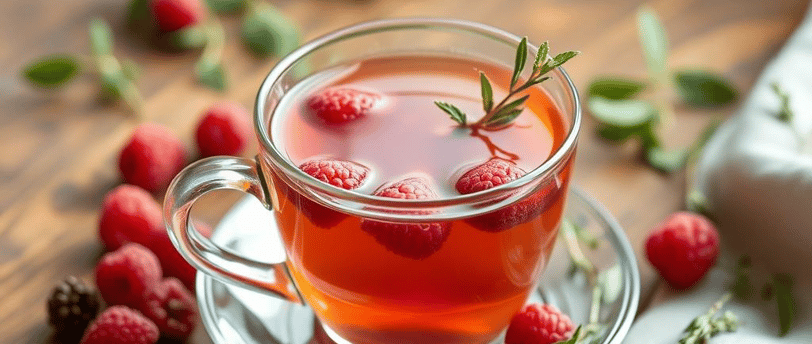Reduce Caffeine for Hormonal Harmony: Swap Coffee for Herbal Teas Like Raspberry Leaf or Chamomile
🧘WELLNESS TIPS🌸 HORMONAL BALANCE & WOMEN’S WELLNESS


In our fast-paced, demanding world, caffeine has become a staple for many individuals seeking to boost energy levels and enhance focus. Whether it’s that invigorating morning cup of coffee or the mid-afternoon pick-me-up, caffeine consumption is prevalent. However, growing scientific evidence suggests that excessive caffeine intake can negatively impact hormonal balance, leading to various health issues. As we delve into the complexities of hormonal health, consider replacing your daily coffee ritual with soothing herbal teas, such as raspberry leaf or chamomile, to achieve greater hormonal harmony.
The Impact of Caffeine on Hormones
Caffeine is a stimulant that largely affects the endocrine system, which regulates hormone production and function throughout the body. Scientific studies have shed light on how caffeine interacts with our hormonal systems, revealing that it may lead to elevated cortisol levels, altered estrogen and progesterone cycles, and increased adrenaline production.
Cortisol: The Stress Hormone
Cortisol, often referred to as the stress hormone, is produced in response to stressors and helps the body respond to challenges. However, chronic elevation of cortisol due to excessive caffeine intake can have detrimental effects on health. Prolonged high levels of cortisol can lead to anxiety, weight gain, immune suppression, and difficulty in hormonal regulation. A study published in Psychosomatic Medicine found that individuals who consume high amounts of caffeine report higher cortisol responses to stress, potentially contributing to a cycle of stress and hormonal imbalance.
Estrogen and Progesterone Disruption
Caffeine consumption has also been linked to changes in estrogen and progesterone levels, crucial hormones in regulating the menstrual cycle and overall reproductive health. Research indicates that caffeine may elevate estrogen levels, which can lead to menstrual irregularities and exacerbate premenstrual symptoms. A study in The Journal of Clinical Endocrinology and Metabolism suggests that women consuming more than one cup of coffee per day may experience greater fluctuations in their menstrual cycles. Proper hormonal balance is essential for overall well-being, making excessive caffeine consumption a concern for many women, particularly those experiencing fertility challenges or menopause symptoms.
Increased Adrenaline Production
Caffeine consumption stimulates adrenaline production, which prepares the body for a "fight or flight" response. While this can be beneficial in moderation, chronic elevation can lead to fatigue and adrenal exhaustion, which manifests as hormonal imbalances. Individuals may find themselves stuck in a cycle: relying on caffeine for energy, only to be met with fatigue and hormonal disruption as a result. According to a study in Hormone Research in Paediatrics, long-term high caffeine consumption can lead to adrenal fatigue, characterized by hormonal imbalances and persistent tiredness.
The Benefits of Herbal Teas
Given the potential negative effects of caffeine on hormonal balance, consider making the switch to herbal teas, notably raspberry leaf and chamomile. These natural alternatives can provide a wealth of benefits without the stimulating effects of caffeine.
Raspberry Leaf Tea
Raspberry leaf tea has long been revered for its numerous health benefits, particularly among women. Rich in vitamins and minerals, including vitamins B, C, and E, magnesium, and calcium, raspberry leaf supports not only hormonal harmony but also overall reproductive health. Scientific evidence supports its use as a natural remedy during pregnancy, as it may help tone the uterus and support labor.
Moreover, raspberry leaf tea can be beneficial during menstruation. The presence of fragarine, a compound that helps relax pelvic and uterine muscles, may alleviate menstrual cramps and discomfort. A study published in The Journal of Midwifery & Women's Health found that women who consume raspberry leaf tea experience reduced labor time and fewer complications during childbirth.
Chamomile Tea
Chamomile tea is another excellent caffeine-free alternative known for its soothing properties. Rich in antioxidants, chamomile has been shown to help regulate cortisol levels and reduce anxiety, supporting better hormonal health. A study featured in the Journal of Clinical Psychopharmacology confirmed that chamomile tea can significantly decrease anxiety symptoms, offering a calming effect that allows for a more balanced hormonal response.
Additionally, chamomile tea is often used as a natural sleep aid. Quality sleep is essential for hormonal regulation, including insulin and leptin, which play a role in appetite control and metabolism. A well-rested body can maintain optimal hormonal levels, reducing the need to rely on caffeine for energy.
Practical Tips for Transitioning Away from Caffeine
If you are considering swapping your daily coffee routine with herbal teas, here are some practical tips for making a smooth transition:
Gradual Reduction: Start by reducing your caffeine intake gradually. This could involve replacing one cup of coffee with herbal tea each day until you find the right balance.
Explore Herbal Options: Experiment with various herbal teas to discover your favorites. In addition to raspberry leaf and chamomile, you might enjoy peppermint, ginger, or lemon balm tea.
Practice Mindfulness: Cultivate a mindful routine around your tea consumption. Take time to savor the aroma and taste, allowing your body to enjoy the calming ritual.
Stay Hydrated: Remember to stay well-hydrated throughout the day. Herbal teas can be part of your hydration routine, but aim to drink plenty of water as well.
Monitor Your Body’s Response: Pay attention to how your body feels after reducing caffeine and incorporating herbal teas. You may notice improved energy levels, reduced anxiety, and more balanced hormones.
Conclusion
The evidence is clear: reducing caffeine can play a crucial role in achieving hormonal harmony. By opting for calming herbal teas, such as raspberry leaf and chamomile, you can foster a more balanced hormonal environment and support overall well-being. Whether you are navigating the challenges of menstrual cycles, pregnancy, or menopause, making this simple swap can lead to improved health and vitality. Embrace the soothing power of herbal teas and reclaim your hormonal balance today!
